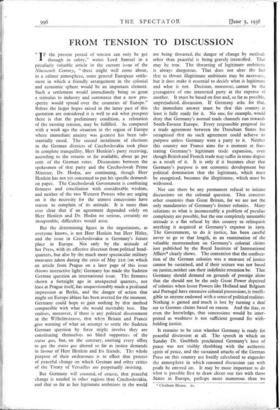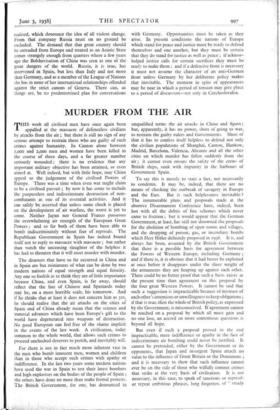FROM TENSION TO DISCUSSION " IF the present period of
tension can only be got 1 through in safety," writes Lord Samuel in a peculiarly valuable article in the current issue of the Nineteenth Century, " there might well come about, in a calmer atmosphere, some general European settle- ment in which a friendly arrangement in the colonial and economic sphere would be an important element. Such a settlement would immediately bring so great a stimulus to industry and commerce that a new pro- sperity would spread over the countries of Europe." Before the larger hopes raised in the latter part of this quotation are considered it is well to ask what prospect there is that the preliminary condition, a relaxation of the existing tension, may be fulfilled. As compared with a week ago the situation in the region of Europe where immediate anxiety was greatest has been sub- stantially eased. The second instalment of elections in the German districts of Czechoslovakia took place in complete tranquillity, Herr Henlein's party receiving, according to the returns so far available, about 90 per cent. of the German votes. Discussions between the spokesmen of that party and the Czechoslovak Prime Minister, Dr. Hodza, are continuing, though Herr Henlein has not yet consented to put his specific demands on paper. The Czechoslovak Government is combining firmness and conciliation with considerable wisdom, and neither of the two Western Powers who are urging on it the necessity for the utmost concessions have reason to complain of its attitude. It is more than ever clear that if an agreement depended solely on Herr Henlein and Dr. Hodza no serious, certainly no insuperable, difficulties would arise.
But the determining figure in the negotiations, as everyone knows, is not Herr Henlein but Herr Hitler, and the issue in Czechoslovakia is Germany's future place in Europe. Not only by the attitude of her Press, with its effective direction from political head- quarters, but also by the much more spectacular military measures taken during the crisis of May 21st (on which an article from Prague on a later page of this issue throws instructive light) Germany has made the Sudeten German question an international issue. The firmness shown a fortnight ago in unexpected quarters, not least at Prague itself, has unquestionably made a profound impression at Berlin, and the danger of action that might set Europe ablaze has been averted for the moment. Germany could hope to gain nothing by that method comparable with what she would inevitably lose. She realises, moreover, if there is any political discernment in the Wilhelmstrasse, that when Britain and France give warning of what an attempt to settle the Sudeten German question by force might involve they are constituting themselves no blind supporters of the • status quo, but, on the contrary, exerting every effort to get the status quo altered so far as justice demands in favour of Herr Henlein and his friends. The whole purpose of their endeavours is to effect that process of peaceful change on which German and other critics of the Treaty of Versailles are perpetually insisting.
But Germany will contend, of course, that peaceful change is needed in other regions than Czechoslovakia, and that so far as her legitimate ambitions in the world are being thwarted, the danger of change by methods other than peaceful is being gravely intensified. That may be true. The thwarting of legitimate ambitions is always dangerous. That does not alter the fact that to thwart illegitimate ambitions may be necessary, but it does make it essential to decide what is legitimate and what is not. Decision, moreover, cannot be the prerogative of one interested party at the expense of another. It must be based on free and, so far as possible, unprejudiced, discussion. If Germany asks for that, the immediate answer must be that this country at least is fully ready for it. No one, for example, would deny that Germany's normal trade channels run towards South-Eastern Europe. Every responsible proposal for a trade agreement between the Danubian States has recognised that no such agreement could achieve its purpose unless Germany were a party to it. Neither this country nor France aims for a moment at frus- trating Germany's legitimate trade expansion, even though British and French trade may suffer in some degree as a result of it. It is only if it becomes clear that Germany's purpose is not economic development but political domination that the legitimate, which must be recognised, becomes the illegitimate, which must be withstood.
Nor can there be any permanent refusal to initiate discussions on the colonial question. That concerns other countries than Great Britain, for we are not the only mandatories of Germany's former colonies. Many solutions to what is incontestably a problem of peculiar complexity are possible, but the one completely untenable attitude is a flat refusal by this country to relinquish anything it acquired at Germany's expense in 1919. The Government, to do it justice, has been careful never to go to that length, as an examination of the valuable memorandum on Germany's colonial claims just published by the Royal Institute of International Affairs* clearly shows. The contention that the confisca- tion of the German colonies was a measure of justice cannot be sustained, and if their seizure was not based on justice, neither can their indefinite retention be. That Germany should demand on grounds of prestige alone that she should not be the only Great Power deprived of colonies when lesser Powers like Holland and Belgium and Portugal have extensive colonial possessions, is intelli- gible to anyone endowed with a sense of political realities. Nothing is gained and much is lost by turning a deaf ear to German claims based on reason. And the fear, or even the knowledge, that concessions would be inter- preted as weakness is not sufficient ground for with- holding justice.
It remains to be seen whether Germany is ready for peaceful discussion at all. The speech in which on Sunday Dr. Goebbels proclaimed Germany's love of peace was not . visibly throbbing with the authentic spirit of peace, and the sustained attacks of the German Press on this country are hardly calculated to engender the atmosphere in which reasoned discussion can with profit be entered on. It may be more important to do what is possible first to draw clo:ier• our ties with those States in Europe, perhaps more numerous than we * Chatham House. 2S. realised, which denounce the idea of all violent change. From that company Russia must on no ground be excluded. The demand that that great country should be extruded from Europe and treated as an Asiatic State comes strangely enough from quarters where a few years ago the Bolshevisation of China was seen as one of the great dangers of the world. Russia, it is true, has intervened in Spain, but less than Italy and not more than Germany, and as a member of the League of Nations she has in none of her international relationships offended against the strict canons of Geneva. There can, as things are, be no predetermined plan for conversations with Germany. Opportunities must be taken as they arise. In present conditions the nations of Europe which stand for peace and justice must be ready to defend themselves and one another, but they must be certain that they do stand for justice as well as peace ; if acknow- ledged justice calls for certain sacrifices they must be ready to make them ; and if a defensive front is necessary it must not assume the character of an anti-German front unless Germany by her deliberate policy makes that inevitable. The moment in spite of appearances may be near in which a period of tension may give place to a period of discussion—not only in Czechoslovakia.



















































 Previous page
Previous page